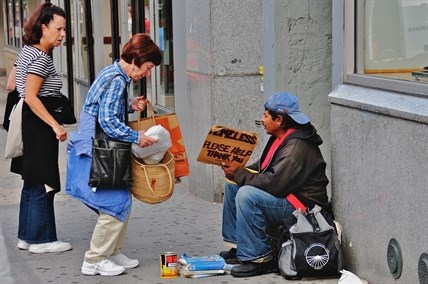
Image Credit: Wikipedia
April 22, 2014 - 5:02 AM
OTTAWA -- A new report says the success of so-called "Housing First" programs could have a limited impact on young Canadians living on the streets.
The report warns against what it calls the "Housing First Jr." approach, saying youth homelessness demands a unique focus on the developmental, social and legal needs of young people that can differ significantly from homeless adults.
The 44-page report, obtained by The Canadian Press, was written by York University professor Stephen Gaetz and is part of the so-called "Homeless Hub" series of studies on homelessness in Canada.
The Housing First approach provides individuals and families with stable housing as an initial first step towards addressing other social issues, rather than the other way around.
It was founded in the early 1990s in New York as an inner-city experiment. Since then, it's had an 85 per cent success rate in the U.S. in permanently housing mentally ill homeless people.
An estimated 30,000 Canadians sleep on the streets every night. The Conservative government is focused on the Housing First strategy, which the Mental Health Commission of Canada has concluded is showing concrete and cost-effective results in five cities.
But Gaetz says it remains an open question whether that approach works for homeless youth.
"We cannot take an established approach that works for adults and simply create Housing First Jr. by changing the age mandate," says the study's executive summary.
"Young people have complex needs, but these may be profoundly different than those associated with adult homeless populations."
Government's defence
Social Development Minister Candice Bergen defended the government's approach.
"Housing First is a proven, evidence-based model that is delivering better results for the most vulnerable, regardless of age, gender or ethnicity, while ensuring the tax dollars of hard-working Canadians are spent wisely," she said in a statement.
"This model has been recognized internationally for its effectiveness and is helping people here at home.... We are proud to be focusing our efforts and resources on programs that will have the largest, long-term impact."
Canadian communities are free to invest in other proven approaches at the local level, such as specific initiatives for homeless youth, she added.
A massive pilot project called At Home-Chez Soi was created in 2008 following a $110-million investment from the federal government. The program helped find and pay for homes for mentally ill homeless people in five cities across Canada, and also provided recipients with as many social services as they needed to stay housed.
As of April 1, the Conservative government's $600-million Homelessness Partnering Strategy shifted to a Housing First approach.
Housing First ineffective for youth
But Gaetz's study, entitled "Coming of Age," suggests Housing First isn't necessarily effective for homeless youth.
"Whether and how it works for youth still remain an askable question," the summary states.
Gaetz cites other research that argues that while many young people thrive in a Housing First environment, those with mental health and addiction issues "find that the choice and independence offered by the model" can be overwhelming.
The report suggests governments develop strategies to prevent young people from ending up on the streets after leaving child protection, mental health or juvenile detention facilities, identify a stronger role for schools as part of the solution and help strengthen families while offering young people a way back home.
"We also understand that many young people can no longer return home or in some cases have no home to go to," the report says.
"For these young people we need strong models of accommodation and supports that will help them move forward with their lives."
The study concluded that Canada also needs to make broader, societal changes to truly vanquish the plight of homelessness.
"We need to ensure that there is an adequate supply of affordable housing," it says.
"We need to ensure young people have the opportunity to earn a sufficient income to pay the rent, purchase food and have fulfilling lives and/or receive rent supplements if they cannot earn a living wage. We must ensure every young person has the opportunity to go to school and fulfill his or her dreams."
Some facts and figures on homelessness in Canada:
How many homeless in a year? The State of Homelessness in Canada 2013 report estimates that each year at least 200,000 individuals seek homeless emergency services or sleep outside at least once.
How many homeless on an ordinary day? On any day, about 28,500 people are homeless and there may also be as many as 50,000 "hidden homeless," including those temporarily "couch surfing" with friends or relatives.
How long do they stay homeless? The median length of a stay in emergency shelter is about 50 days, although most people need beds for less than a month and 29 per cent stay only one night. Most manage to find their own places, usually with little support.
How many are chronically homeless? 4,000 to 8,000.
Source: The Homeless Hub
News from © The Canadian Press, 2014